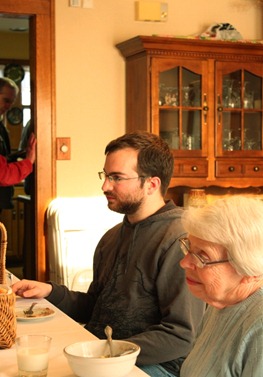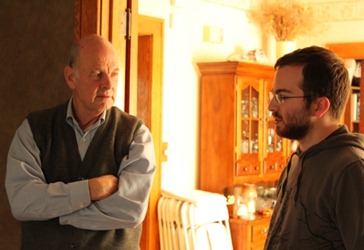So many today are totally turned off by institutionalized faith. For many years now, “spiritual but not religious” has been a popular mantra. Many of us are interested in a life of faith, but not one that is connected to a particular community or tradition.
The Emergent Church movement has borne the marks of this shift. Rather than committing themselves to a particular Christian tradition, many post-modern Christians are experimenting with an  eclectic faith, incorporating elements from various Protestant streams, and even Roman Catholic and Eastern Orthodox traditions.
eclectic faith, incorporating elements from various Protestant streams, and even Roman Catholic and Eastern Orthodox traditions.
The post-modern penchant for diverse worship styles, however, is only the tip of the iceberg.
The new paradigm that has been coming to the fore in recent decades often involves not merely a rejection a single normative Christian tradition, it has in many cases resulted in à la carte spirituality. Tradition (Christian or otherwise) becomes an accessory, decontextualized from the communities in which it developed and imported piece-meal into the devotional lives of seekers looking for guidance in their individual quests for meaning.
Our quest for a personalized spiritual experience does not stop there. We are increasingly shopping for religious community, too. Millions of Americans today are on an extended church-shopping spree, cycling between various religious communities in search of the “right fit.” For so many, this spiritual scavenger hunt never ends. No church, no human community, can ever fully measure up to our highest expectations.
Wherever we go, we will find hypocrisy, moral failure, spiritual blindness and plain stupidity. Yet, we also encounter beauty, sobriety, compassion and faithfulness. In every community, the good is mixed in with the bad. Just like in each human heart. However, so many today are abandoning commitment to religious community in the face of the Church’s failure to live up to the high calling we have in Jesus.
community in the face of the Church’s failure to live up to the high calling we have in Jesus.
The Church deserves critique, as we have certainly failed miserably on countless occasions. We continue to fail, to betray our Lord through our lack of faith and compassion. Despite all of our failings as the Body of Christ, we need the community that we find there. It is through particular communities of believers that Jesus Christ is present in the world and blesses it. However, it is difficult to receive the blessing of community when we are unwilling to accept the good with the bad. It is unlikely that we will receive the benefit of Christian community when we come to be served rather than to serve, to be fed rather than to feed others.
I do believe that each of us has a great deal to learn from other Christian communities and traditions, and even from non-Christian communities and traditions. I see value in efforts to reach across historical divides and find how God is present in other historical manifestations of Christ’s Church. However, these explorations are always done from a particular context.
My own context is Orthodox Quakerism. As an Orthodox Friend, I am embedded in a living community of faith that stretches across the United States and the world, and my community is enriched by the tradition we receive from our ancestors through writings and inherited institutions. However, the crux of our tradition is the ways that we embody it in our present-day life together. Gathered together as Friends of Jesus, we live an embodied tradition that cannot be summed up in writing, historical markers or buildings. Tradition is enfleshed in our imperfect community as we strive to be faithful to the ongoing teaching of Jesus Christ in our midst.
community as we strive to be faithful to the ongoing teaching of Jesus Christ in our midst.
This kind of incarnation is a full-body experience, not the adoption of certain quaint customs, procedures or an intellectual lineage. The essence of who we are as God’s people cannot be learned from books, and we cannot pick it up through occasional church-shopping visits. It is a reality that must be habitually lived and absorbed in community.
This is the tragedy of our “spiritual but not religious” generation, our age of tradition-swapping and consumeristic religion: It simply does not work. Tradition and human community cannot be separated from one another, and not even those two things together can substitute for long-suffering submission as individuals to the community, and the community as a whole to Christ’s Holy Spirit. There is no buying that.